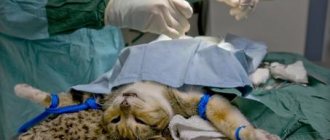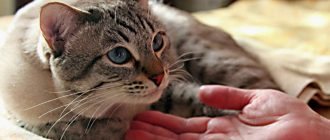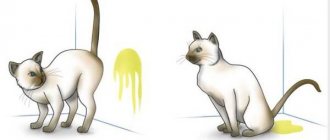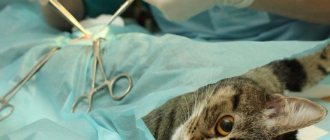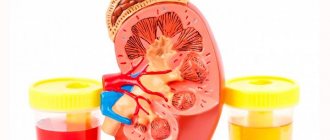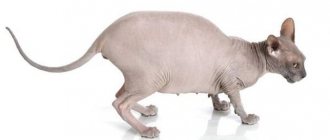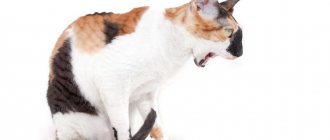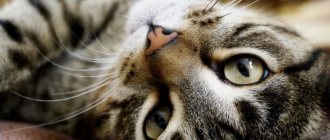Almost every cat owner once faces the question of castration of their pet. It is believed that castration has both positive and negative sides. The cat castration operation itself is not complicated. This is the removal of an animal's gonads through surgery.
Positive aspects of castration of cats:
- The animal's character improves. The cat will become more affectionate, calm and obedient.
- The animal will no longer mark its territory with secretions, leaving an unpleasant odor.
- Aggressive behavior and loud screams at night during “partying” will stop.
- Suppressed sexual instincts will not force the cat to look for a partner and rush outside. He will become a quiet pet.
- The risk of contracting a sexually transmitted infection is practically eliminated, and interest in cats disappears.
- Neutered cats live longer, about 3-4 years, as they lead a calmer home life.
All this has a positive effect on both the animal itself and the owner.
Possible negative points:
- After surgery, the cat begins to eat with a vengeance due to hormonal changes. Becomes less mobile and lazy. All this leads to pet obesity. These troubles can be solved by proper feeding and increasing the activity of the animal.
- After surgery, adult cats may still have problems walking and singing. Since in adult (mature) cats, not only the testes, but also the pituitary gland are responsible for the production of hormones. The castration operation may become useless. But it will help solve the problem of tag smell.
- There may be problems in the functioning of the cardiovascular system immediately after the operation. This is due to the use of anesthesia. This is more common in adult and older cats.
Veterinarians recommend castrating your pet before puberty, i.e. after eight months of age. Before surgery, it is mandatory to examine the animal to identify possible contraindications in order to exclude complications after surgery. Usually the operation lasts about half an hour.
After castration surgery, any complications are extremely rare. The doctor will listen to the cat's heartbeat and make sure that he is recovering from anesthesia. Caring for an animal after surgery is not difficult, the main thing is to follow the recommended diet, care for and love the animal.
Cat behavior after castration
Castration surgery for a cat is extremely stressful. His behavior after emerging from anesthesia is influenced by the degree of arousal before anesthesia, the anesthesia itself, and the environment after awakening. In reality, everyone behaves differently: some are calm and lethargic, and some are aggressive and uncontrollable.
An attack of aggression upon recovery from anesthesia can be provoked by the behavior of the owners or the resulting pain. Showing increased attention and affection, you can be bitten and scratched, even by a kind cat. After some time, the pain will go away, the stitches will heal, and the pet’s condition and mood will normalize. The cat will lead its usual lifestyle.
It is anesthesia that affects the duration of the animal’s recovery from anesthesia. I use two types of anesthesia - general and local. Local anesthesia passes quickly - within an hour the animal usually comes to its senses. General anesthesia will require a long time to fully awaken, sometimes up to a day. Recovery from general anesthesia is slow and gradual. The animal experiences weakness, lack of coordination of movement, and disorientation in space. Nausea and loss of appetite may occur.
At this time, you should not leave the cat on the sofa, bed or other elevated surfaces from which it could fall. When he wakes up, he can fall asleep again, he still lacks good coordination and strength. He cannot calculate the distance and trajectory of the jump. This may result in a bad fall and injury.
All animals go through the stage of awakening from anesthesia differently. Therefore, it is difficult to say exactly when he will come to his senses. It is necessary to monitor your pet's condition for several days after surgery. Residual effects after anesthesia may appear. Most often this is a lack of coordination, lethargy, dizziness, and drowsiness.
If the cat tries to hide in a quiet place, let him be alone, do not disturb him. When he recovers, he will come to you. Sometimes the animal, on the contrary, is in an overexcited state. It can meow loudly, run around the apartment, jump, attracting the attention of its owners. Such a cat will require an “eye and an eye.” After all, his coordination has not yet recovered.
If a sexually mature cat was operated on, then after the operation for some time, he can continue to mark with the same intensity. This may last for several weeks. Gradually, the level of remaining sex hormones will decrease and disappear. The cat will calm down and stop leaving marks.
But not all cats stop leaving marks after castration; this largely depends on the environment. If the animal marked due to sexual desire, then such marks will stop. If this was a mark of territory, then they will mark for some time. Some individuals mark their entire lives no matter what.
If the cat has had experience communicating with a cat, at first he may try to mate. This will not bring offspring. If a young male, immature, is castrated, then he will not have any problems with the cat’s demand.
The behavior of any cat after castration changes only for the better. Surprised owners discover an affectionate, domestic cat at their feet, the smell of urine gradually dissipates, aggression and nightly screams disappear, everyone is happy, including the pet. He is no longer a preoccupied male, but a balanced and well-groomed social “lion”.
Disadvantages of castration of cats
- After this operation, some pets become lazy and inactive, as a result of which they often suffer from overeating and obesity, since they spend less energy than an uncastrated cat.
- Sometimes cats, after castration, begin to suffer from diseases of the cardiovascular system, and to prevent this, you need to choose the right diet.
- Anesthesia is also a kind of risk for an animal; if for a young cat it is very small, then for an old cat this is quite a big health risk, because some individuals may not tolerate it at all.
- Possible occurrence of urolithiasis.
- Castration, like any surgical intervention, can be accompanied by complications (but these are quite rare cases).
However, many consequences can be avoided if you approach this operation with full responsibility.
Cat rehabilitation and post-operative care after castration
Rehabilitation care for a cat after castration surgery does not require any special procedures. If no complications are identified, the recovery process will take 2-3 days. The animal usually requires rest and attention. The cat sleeps a lot and eats little. Damaged tissues will require care; they need to be treated with special antibacterial agents and, if necessary, apply antibiotic ointment. A veterinarian will provide advice on these remedies.
Cats rarely experience pain at the suture site. However, in some cases, pain relief may be used. If the animal quickly came to its senses and looks healthy, there is no point in pumping it with medications. One way or another, the cat is really able to cope with castration in the absence of auxiliary drugs. Full recovery after castration in the absence of complications lasts no more than a week.
Most often, sutures do not cause any pain in cats. In rare cases, pain relief may be required. If the cat quickly recovered from anesthesia, looks healthy, nothing bothers him, then you should not “pump him up with medications.” By nature, the cat itself can cope with the consequences of castration surgery without medications. It usually takes 6-7 days until complete recovery after surgery.
General recommendations after surgery:
- After surgery, place the cat in a spacious carrier so that in an unconscious state, movements are not limited. Or place it on the floor in a warm, draft-free place. You should not do this near heating devices, as this will cause the wound to open. The air should be fresh and the lighting should not be bright.
- Place a tray nearby without filler. It must be washed after every trip to the toilet.
- Provide your cat with enough water. After anesthesia, the animal experiences severe thirst, which must be quenched. You can wet the animal's mouth with a syringe if it cannot drink for a long time. You can drink from a syringe only after your pet wakes up.
- You should not allow your cat to lick the stitches, as this can cause bleeding and infection. You can put a plastic collar on it so it won't reach the seams.
- Do not scold your cat if he goes to the toilet in the wrong place for the first time. He will return to the litter box once the stress and pain have passed.
- It is recommended not to wash your cat for a month after surgery. This is necessary for complete healing of stitches and wounds. If hygiene procedures are necessary, you can use wet wipes.
Cats after castration recover much faster and easier than cats after sterilization. This is due to lower tissue trauma and a small area of surgical intervention.
Please pay attention to the following important points:
- Temperature. Even a short-term increase in temperature is a reason to urgently contact a veterinarian. This may be a sign of an early infection.
- Refusal of water and food for more than a day, lethargy, apathy and weakness of the pet.
- Condition of seams. The surface should be dry, clean and without any signs of suppuration. The owner should be wary if the wound is still bleeding after a day. This can only occur in the first few hours after surgery.
- The abdomen is tense, pain is felt on palpation.
- Heart rate increased, shortness of breath appeared.
After the operation, the veterinarian will give all the necessary recommendations for further care for the complete and high-quality recovery of the animal.
After a short period of time, your pet will completely forget about the troubles he suffered and return to his normal lifestyle. He will no longer be disturbed by unclaimed hormones.
How to care for a cat after sterilization at home?
In general, no special care is required for your cat after sterilization. After bringing your cat home from the veterinary clinic, it is best to leave her alone in a familiar, quiet room with dim lights. If 3-4 hours have passed since sterilization, you can return the bowls with food and water.
If possible, for several days, while intensive healing of the muscles and skin of the abdominal wall takes place, it is necessary to exclude contact of the operated cat with other animals and small children, and also refrain from active games with balls and strings. You should also not encourage your animal to jump on furniture.
On the first day after sterilization, the cat may be less active than usual, sleep more, and its appetite and thirst may be reduced. This is due to the anesthesia and stress from visiting the veterinary clinic. Owners should ensure that the cat visits its litter box in a timely manner - urination and defecation should be carried out without delay, as usual.
How and what to feed after castration?
After the operation, you can feed the cat only after 8-10 hours and after full awakening. If you try to feed him earlier, he will most likely just throw up. The stomach is not yet ready to receive food and cannot digest it. But you can’t limit water; it should always be in sufficient quantity and accessible.
It is better to give liquid food after surgery; it can be meat broths, fermented milk products, if there is no lactose intolerance. Try not to overload the cat's stomach, maintain a light diet. Temporarily exclude:
- dry food;
- canned food;
- meat;
- fish;
- porridge or cereals;
- vegetables.
Introduce food into the diet gradually, you can dilute it with water. Nutrition must be kept under control in the future. A pet accustomed to natural food can eat beef, rabbit, some boiled vegetables and cereals. It is advisable to periodically give your pet vitamin supplements. Feeding food from the table is highly undesirable.
After castration surgery, even if the cat has been accustomed to dry food, change it to a special one designed for neutered cats. Introduce it into your diet gradually. An animal's refusal to eat for more than 2 days is a reason to consult a doctor. This may be caused by an inflammatory process in the body.
Possible complications after castration
Complications following castration surgery are very rare. Before carrying out the procedure, animal owners should familiarize themselves with the possible risks, consequences and diseases of neutered cats. As well as the prevention and treatment of complications. Sometimes unpleasant situations arise. If the animal has chronic diseases, surgery may aggravate them. To assess possible risks, your veterinarian may order tests and conduct clinical studies.
Constipation in a cat
One of the side effects of anesthesia is constipation. In this regard, the cat may not go to the toilet for several days. To eliminate the discomfort, you can give your pet a little Vaseline oil.
Cat has diarrhea
Diarrhea after castration of a cat is a very rare occurrence. Most often this is a reaction to stress. In any case, it is necessary to establish the cause if such a nuisance occurs. To do this, you need to see a doctor and get tested. It could be a bacterial infection.
Difficulty urinating
This illness is possible in the first couple of days, since, firstly, your pet has hardly consumed liquid or food in the last few hours. Secondly, urination is still a painful procedure for the animal, so it is in no hurry to do it.
After surgery, especially at first, it is difficult for the cat to use the litter box. It can empty itself in the wrong place. Don't be angry with him for this. In a few days he will return to his previous self and will go to the litter box without any problems. To avoid puddles throughout the house, you can wear diapers for your cat.
Symptoms requiring special attention
If more than two days have passed after the castration operation, and your cat is trying to go to the toilet to no avail or is meowing loudly while urinating, you should definitely show the animal to a veterinarian.
If traces of blood are detected in an animal’s urine, you need to find out the cause of what is happening. It is possible that blood and ichor are still leaking from the healing wound; this may happen at first. But if bleeding is accompanied by blue mucous membranes, fainting and weakness of the animal, immediately contact a veterinarian.
Below are the symptoms, if detected, you must urgently contact the doctor who performed the castration. Describe in detail the pet’s condition, signs that are disturbing it, to take further action:
- increased body temperature;
- stiff gait resulting from discomfort in the perineal area;
- lethargy, refusal to eat for several days;
- painful stomach;
- difficulty urinating;
- purulent discharge from the wound.
Most complications occur in the first 2-3 days after surgery. If nothing terrible happened during this period, then, as a rule, no problems will arise in the future.
Important rules for treating wounds
The animal’s recovery in the hours and days after surgery depends on its body, as well as on wound care and treatment.
- When a cat is castrated, a complex wound is formed on his body, which requires stitches. To make them heal faster, regular treatment is required (twice a day) using brilliant green or hydrogen peroxide . The veterinarian will show you how correctly the treatment is carried out. Among the recommended products there is also an effective ointment Levomekol with an anti-inflammatory effect.
- After castration, the cat should wear a collar , which will prevent scratching of the wound. Thanks to a special collar, the pet does not lick itself at the operation site or scratch it with its paws. If you do not wear this lightweight design, inflammation may occur at the seam. The collar is removable for feeding.
- In rare cases , experts prescribe antibiotics if inflammation of the wound is possible. During inflammatory processes, cats feel unwell and their appetite decreases. The likelihood of such a complication depends on immunity.
If the cat licks the wound, the stitches may come apart , and sometimes bleeding occurs. A small diaper with a hole for the tail can serve as a preventative measure. In it, the animal does not lick the suture site, and the process of tissue fusion is not disrupted.
